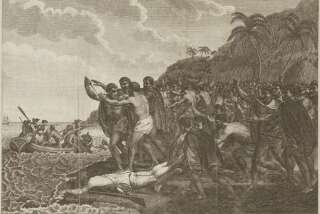Greene and God: A Reprise : THE CAPTAIN AND THE ENEMY<i> by Graham Greene (Viking: $17.45; 189 pp.) </i>
- Share via
Running through the mist and over wet leaves to elude some bullying schoolmates, the narrator of “The Captain and the Enemy” comes upon his headmaster in conversation with a tall man in a bowler hat.
“He carried a walking stick over his shoulder at the slope like a soldier with a rifle. I had no idea who he might be, nor, of course, did I know how he had won me the previous night, or so he was to claim, in a backgammon game with my father.”
It is a heart-lifting start. Not just for its bravura mix of the comic, the far-fetched and the mysterious, but because it tells us something else. That Graham Greene, who is 84 and has lost steam-pressure in recent books, is still capable of a few almighty toots.
To tell the truth, the steam subsides before the book does, and its final third or so is more playing-out than play. But by that time, Greene has managed to recall for us his various masterful modes--his entertainments, his love stories, his picaresque adventurers, and his seriocomic versions of religious faith and political intrigue.
In other words, the reader will think, most variously, of “The Heart of the Matter,” “The Power and the Glory,” “The Quiet American,” and “Travels With My Aunt.” Yet “The Captain and the Enemy,” until it fades, is not simply a pastiche but a kind of golden reunion--everything is familiar but subtly enhanced.
The mysterious captain, who carries off Jim--the narrator--after showing the headmaster a note signed by Jim’s father, is, apparently, a buoyant scalawag. His first stop is an inn where he books two rooms and treats himself and Jim to a lavish meal. Always take a room, he tells the boy; that way, you can sign for your food.
What about the suitcase they left behind, Jim wants to know after they skip out without paying the bill. It was an old suitcase, the captain explains; it contained bricks and “One can always lay one’s hand on a few bricks when required.”
Jim, whose widowed father had left him under the vague authority of Muriel, his detested aunt, is perfectly willing to go with his new patron. The Captain takes him to a house in a London slum, introduces him to Liza, his companion, and then--after going out to steal him a pair of orange pajamas--disappears.
Jim grows up in this odd household. Liza is kind but not demonstrative; all her energy goes into her devotion to the Captain, who comes and goes unpredictably, in differently dyed sets of whiskers and other secretive arrangements. He steals a Bible so that Jim can learn religion, and during his spells at home, he gives him geography lessons based on his own escape from a prison camp in Germany.
So, when Jim’s outraged aunt finally tracks him down, accompanied by his nervous father, the boy can demonstrate his education. To get from Germany to Spain, “I go to Belgium first . . . I take a train there to Paris, and from Paris I take another train to Tarbes,” he recites. “After Tarbes, I’d walk across the Pyrenees. By night,” he adds, “listening for the sound of German boots squish-squashing in the snow.”
And when the aunt turns on Jim’s father, demanding action against the “kidnapers,” the latter protests that the Captain had won Jim fairly, though it was in chess, not backgammon. “You told me he cheated,” says Muriel. “Of course he cheated, Muriel,” the father replies. “So did I. Women don’t understand the point of a game like chess.”
The Captain is an adventurer who ends up running guns to the Sandinistas. (Somoza is not yet overthrown.) But he is more than that; he is one of Greene’s sinner-saints. His long absences, his unpredictable returns, his benevolence, his aloofness, take on a mystical dimension.
Quite without strain, in fact, his gamble with Jim’s father hints at one of the legends of God and Lucifer throwing dice for the fate of mankind. The father, in fact, is nicknamed “The Devil.”
The suggestion is made, in a different way, by Liza, when Jim asks if the Captain loves her. “Oh, love. They’re always saying God loves us. If that’s love I’d rather have a bit of kindness.”
And as a grown man, Jim remembers the Captain this way:
“If it were possible for the Captain to read what I am writing now he would learn how much I have continued to wonder about him--he is to me an eternal question, like the existence of God; and so, as all theologians do, I continue to write in order to turn the question over and over without any hope of an answer.”
That is Greene, of course, as well as Jim.
If the Captain is both comic and divine--a divine mountebank--he is also part of the most touching of love stories. Eventually, he leaves for good--to Panama--but he sends money to Liza, promises to bring her over and protests that she is his whole life.
Jim, we learn, was a present to keep her company in his long absences; another man would have brought a dog. It is a ridiculous love, but a real one. Before Liza dies, she sends the Captain a note: “You are the kindest man I’ve ever known.”
Confidence man, fugitive but true lover, saintly sinner and something more, the Captain, as recorded by the chilly, earth-bound Jim, provides the book’s persistent exhilaration.
At the end, hounded in Panama by the sinister Mr. Quigly with connections to the CIA, the Captain also becomes one of Greene’s martyrs of the left. This whole last part--Jim goes to Panama to find him and turns martyr himself--lacks the enchantment of the earlier sections. It is a reprise of Greene’s novels of political intrigue and betrayal, but it seems effortful and thin.
More to Read
Sign up for our Book Club newsletter
Get the latest news, events and more from the Los Angeles Times Book Club, and help us get L.A. reading and talking.
You may occasionally receive promotional content from the Los Angeles Times.






